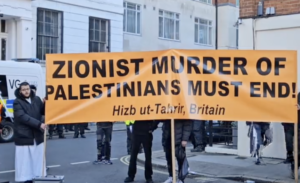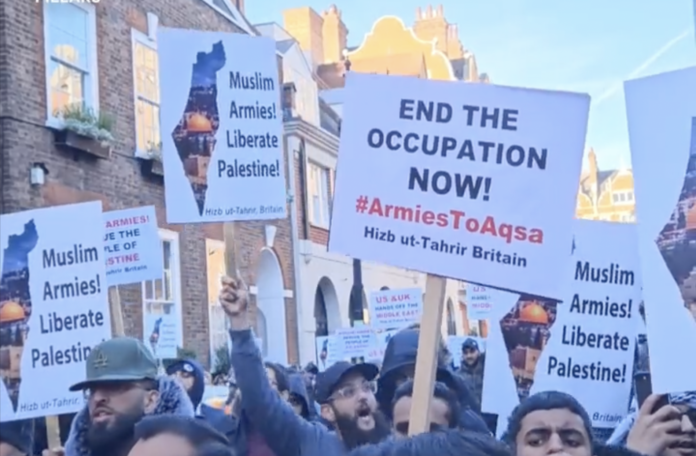As news hit that the British government plans to outlaw Hizb ut-Tahrir, prominent Muslims took to social media to criticise the move as an attack on the community’s free speech.
British Home Secretary, James Cleverly, has laid the draft order before Parliament aimed at proscribing Hizb ut-Tahrir under the Terrorism Act 2000.
If Parliament backs the plan, the order will come into force on January 19, making it a criminal offence to belong to, invite support for and display articles in a public place in a way that arouses suspicion of membership or support for the group.
The announcement has sparked a tidal wave of criticism from senior members of the British Muslim community.
The Managing Director of CAGE International, Muhammad Rabbani, said: “The government today stands accused of aiding and abetting Israeli genocide in Gaza. In the face of mounting pressure, swelling public outrage and criticism over its latest military strike on the people of famine-ravaged Yemen, it seems that reverting to the twice-failed attempt of proscribing Hizb ut-Tahir is a convenient ‘culture wars’ distraction.
“It is high time that the British government returned to independently governing this country and not according to the whims and desires of genocidal apartheid regimes.”
The Islamic Human Rights Commission published a statement expressing their “deep concern” that the anti-terrorism laws are being used to “stifle legitimate political debate and participation.”
Subscribe to our newsletter and stay updated on the latest news and updates from around the Muslim world!
The IHRC statement said: “The government decision to proscribe as ‘terrorist’ the political group, Hizb ut-Tahrir, is an authoritarian and flagrantly Islamophobic act that seeks to stifle opposition to the Israeli genocide in Gaza.
“By banning an organisation that the government itself has acknowledged is non-violent, British authorities are signalling their intent to continue with an established policy of using anti-terrorism laws to try to muzzle opposition voices and crush dissent.”
Elsewhere, British journalist Mehdi Hasan took to X to question the controversial move saying: “I spent my teenage+college years arguing with, & against, Hizb ut-Tahrir. My first ever published article in 2009 was a critique of their ideology. But that said, are they terrorists? Has the UK government provided evidence that they’re terrorists? What happened to free speech?”
The CEO and founder of The Cordoba Foundation, Anas Altikriti, also expressed dismay at the terror listing.
Altikriti said via X: “This is a disgraceful decision. Hizb ut-Tahrir are NOT a terrorist group! The government is just throwing about accusations and devaluing the actual essence of what is a very serious claim.”

Lawyer, writer and activist, Fahad Ansari, posted on X claiming that Hizb ut-Tahrir have always promoted “non-violent struggle.””
“Hizb ut-Tahrir is not a terrorist group. It has a history of promoting non-violent struggle and has not been connected with any terrorist plots or activities. It is for these reasons that previous plans by both Blair and Cameron to ban the organisation had been shelved.
In moving to proscribe the organisation, the UK is demonstrating three things: 1. The lowering of the threshold for proscription in order to silence free speech. 2. Its subservience to Israeli policy. 3. It’s desire to join the great bastions of freedom that have also banned the group – Bangladesh, China, Pakistan, Saudi Arabia, Jordan, Uzbekistan, Egypt, Kazakhstan, Tajikistan, Kyrgyzstan, and Germany.”
The terror listing plan by the Home Secretary has sent shock waves even outside of the British Muslim community.
U.S.-based Dr Omar Suleiman, President of the Yaqeen Institute, also weighed into the controversy saying: “British Muslims and rights orgs.: You must unite and challenge this no matter what your opinion on Hizb ut Tahrir is. Once governments target non-violent movements, it gives them a broad brush to violently crackdown with ideological litmus tests and no accountability.”
Hizb ut-Tahrir has pledged to challenge the proscription and has called the government move a “desperate measure to censor debate about the genocide in Palestine and to stop Islam’s just political alternative.”
In a statement the government added that “certain proscription offences can be punishable by up to 14 years in prison, which can be handed down by a court alongside or in place of a fine.”
Hizb ut-Tahrir created headlines across the UK last year after conducting several protests outside Muslim-majority nations Embassies urging “professional armies from the Muslim world” to intervene militarily to rescue Gaza.
James Cleverly, the Home Secretary, said: “Hizb ut-Tahrir is an antisemitic organisation that actively promotes and encourages terrorism, including praising and celebrating the appalling 7 October attacks.
Proscribing this terrorist group will ensure that anyone who belongs to and invites support for them will face consequences. It will curb Hizb ut-Tahrir’s ability to operate as it currently does.”
Former British Prime Minister Tony Blair vowed to ban Hizb ut-Tahrir as part of a counter-extremism plan after the 7 July 2005 bombings, but the proposals were dropped.
Blair’s failure was criticised by David Cameron but by the time Cameron stepped down as Prime Minister eight years later, no ban had been implemented place.
On both occasions, the plans were dropped after protests that the group was non-violent and claims from lawyers that a ban would be unenforceable.
With headquarters in Lebanon, the group operates in at least 32 countries including the U.S., Canada and Australia.
Hizb ut-Tahrir was established in Jerusalem in the 1950s with a vision of a return to a Caliphate across all Muslim countries.






















